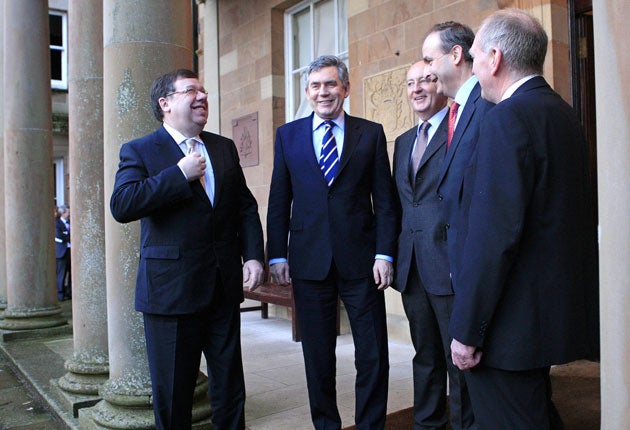Labour goes on the offensive over Tory family policies
David Cameron's plans for a married couples allowance have been derided as a 'John Terry tax'

Gordon Brown last night sought to capitalise on confusion in Tory strategy as he staked his claim for the centre ground of British politics.
Buoyed by the narrowing gap between Labour and the Conservatives in the polls and an outburst of discontent from Tory MPs in the backbench 1922 Committee last week, the Prime Minister said Labour would "always be on the side of the families of Middle Britain".
Mr Brown's new-found optimism exactly three months before the expected date of the general election spilled into the Cabinet, as Harriet Harman went on the offensive, describing Tory plans for a married couples allowance as the "John Terry tax".
The Labour deputy leader (pictured) said "some people" were using the case of the sacked England captain to illustrate how men who cheated on their wives could, in theory, benefit from David Cameron's plans.
Ms Harman said: "Some people are calling it the John Terry tax. I wouldn't say that, but that is being said around and about."
A Tory source said: "This just shows Labour's true colours regarding marriage, and the contempt in which they hold it – how insulting this is for millions of hard-working married couples."
The latest ICM poll for The Sunday Telegraph showed the Conservatives are on 39 per cent, nine points ahead of Labour. In an interview with The Observer, Mr Brown insisted he was not complacent but claimed: "Labour can still win it [the election]. I'm absolutely sure of that."
Labour, the Conservatives and the Liberal Democrats are in talks about a US presidential election-style memorandum of understanding (MOU) – in effect, a "no gaffes pact" – to govern the three television leaders' debates during the election campaign.
The 32-page contract agreed between George Bush and John Kerry for the 2004 presidential election debates – the only presidential MOU in the public domain – is being used as a "blueprint" for the British debates, to be held every Thursday of the campaign bar polling day.
The contract would dictate everything, down to the political affiliations of the audience and how long each leader is filmed during camera cut-aways; it would also allow them to bring their own make-up artists.
But talks on Wednesday to hammer out the terms of the contract on behalf of Mr Brown, Mr Cameron and Nick Clegg became mired in argument and ended without a deal.
In a further sign of party political hostilities, Mr Clegg, the Lib Dem leader, made an extraordinary admission in relation to debate on what his party would do in a hung parliament.
Several polls have suggested the election, expected on 6 May, would leave no party with an outright majority. Mr Clegg used a newspaper interview to criticise Labour's broken promises in 1997 over a Lib-Lab pact. He said: "Look at the way Paddy [Ashdown] was left at the altar. He says, 'Just don't go anywhere near them again. It might have made sense then, but don't [do it].' "
In his weekly Downing Street podcast yesterday, Mr Brown said only Labour would protect child tax credits and Sure Start centres for middle-class families – centres which the Conservatives have said they would scrap – as well as for the poorest.
Mr Brown said: "I come from Middle Britain. I refuse to be deflected by those who seek to frustrate our plans for a fairer, more prosperous country.
"Even in recession, Britain has not cut, but expanded, those measures vital for a middle-class jobs revolution – because this transformation is the answer to all parents worried about the future prospects for their families."
Ms Harman said she was pressing for an international network of female ministers and MPs to push issues affecting women into the mainstream.
"Women ministers are still very much in the minority, and there is still a struggle to get these agendas to centre stage," said the Minister for Equality and Commons Leader.
The world of international relations and summits has been, until now, a male-dominated activity, she added. The Deputy Leader will host 28 female ambassadors and other diplomats based in London on Tuesday as part of the network, which will support a new UN agency for women.
Subscribe to Independent Premium to bookmark this article
Want to bookmark your favourite articles and stories to read or reference later? Start your Independent Premium subscription today.

Join our commenting forum
Join thought-provoking conversations, follow other Independent readers and see their replies